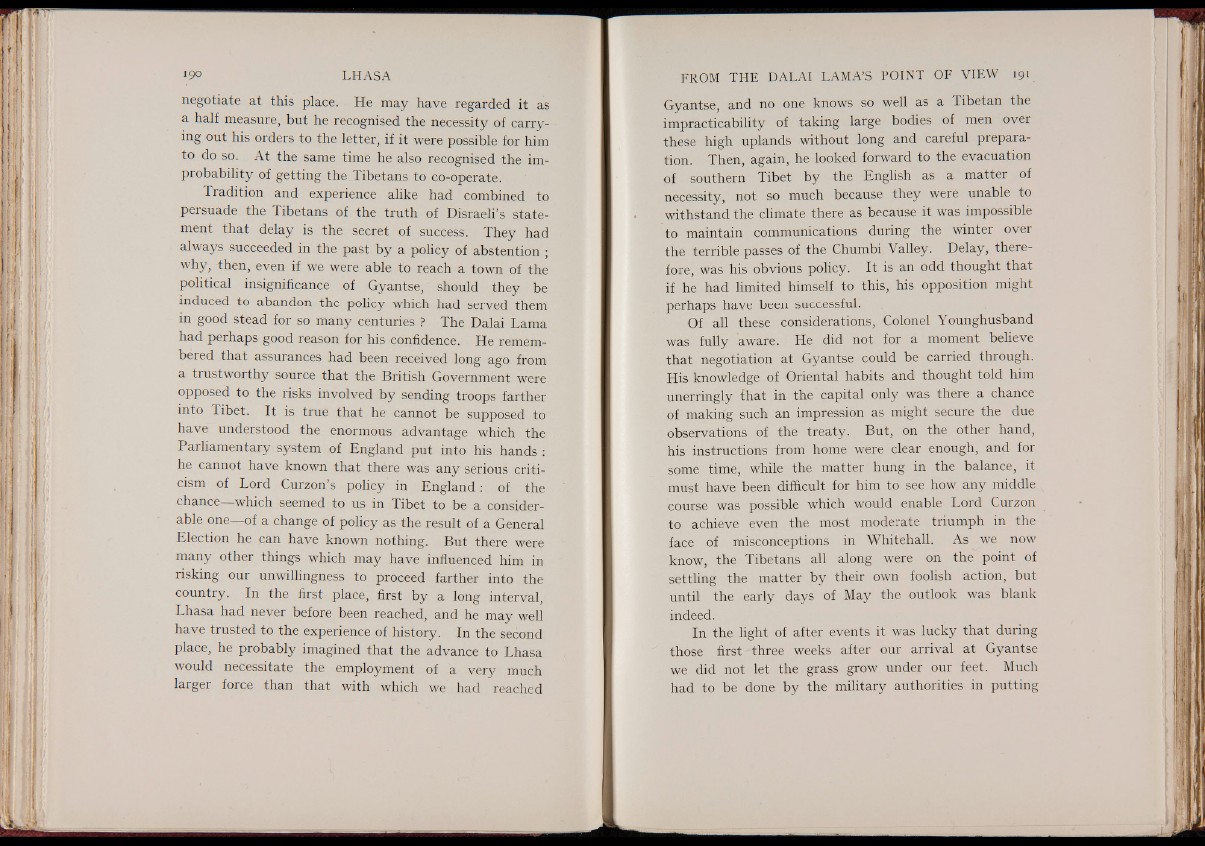
negotiate at this place. He may have regarded it as
a half measure, but he recognised the necessity of carrying
out his orders to the letter, if it were possible for him
to do so. At the same time he also recognised the improbability
of getting the Tibetans to co-operate.
Tradition and experience alike had combined to
persuade the Tibetans of the truth of Disraeli’s statement
that delay is the secret of success. They had
always succeeded in the past by a policy of abstention ■
why, then, even if we were able to reach a town of the
political insignificance of Gyantse, should they be
induced to abandon the policy which had served them
in good stead for so many centuries ? The Dalai Lama
had perhaps good reason for his confidence. He remembered
that assurances had been received long ago from
a trustworthy source that the British Government were
opposed to the risks involved by sending troops farther
into Tibet. It is true that he cannot be supposed to
have understood the enormous advantage which the
Parliamentary system of England put into his hands :
he cannot have known that there was any serious criticism
of Lord Curzon’s policy in England: of the
chance which seemed to us in Tibet to be a considerable
one— of a change of policy as the result of a General
Election he can have known nothing. But there were
many other things which may have influenced him in
risking our unwillingness to proceed farther into the
country. In the first place, first by a long interval,
Lhasa had never before been reached, and he may well
have trusted to the experience of history. In the second
place, he probably imagined that the advance to Lhasa
would necessitate the employment of a very much
larger force than that with which we had reached
Gyantse, and no one knows so well as a Tibetan the
impracticability of taking large bodies of men over
these high uplands without long and careful preparation.
Then, again, he looked forward to the evacuation
of southern Tibet by the English as a matter of
necessity, not so much because they were unable to
withstand the climate there as because it was impossible
to maintain communications during the winter over
the terrible passes of the Chumbi Valley. Delay, therefore,
was his obvious policy. It is an odd thought that
if he had limited himself to this, his opposition might
perhaps have been successful.
Of all these considerations, Colonel Younghusband
was fully aware. He did not for a moment believe
that negotiation at Gyantse could be carried through.
His knowledge of Oriental habits and thought told him
unerringly that in the capital only was there a chance
of making such an impression as might secure the due
observations of the treaty. But, on the other hand,
his instructions from home were clear enough, and for
some time, while the matter hung in the balance, it
must have been difficult for him to see how any middle
course was possible which would enable Lord Curzon
to achieve even the most moderate triumph in the
face of misconceptions in Whitehall. As we now
know, the Tibetans all along were on the point of
settling the matter by their own foolish action, but
until the early days of May the outlook was blank
indeed.
In the light of after events it was lucky that during
those first three weeks after our arrival at Gyantse
we did not let the grass grow under our feet. Much
had to be done by the military authorities in putting